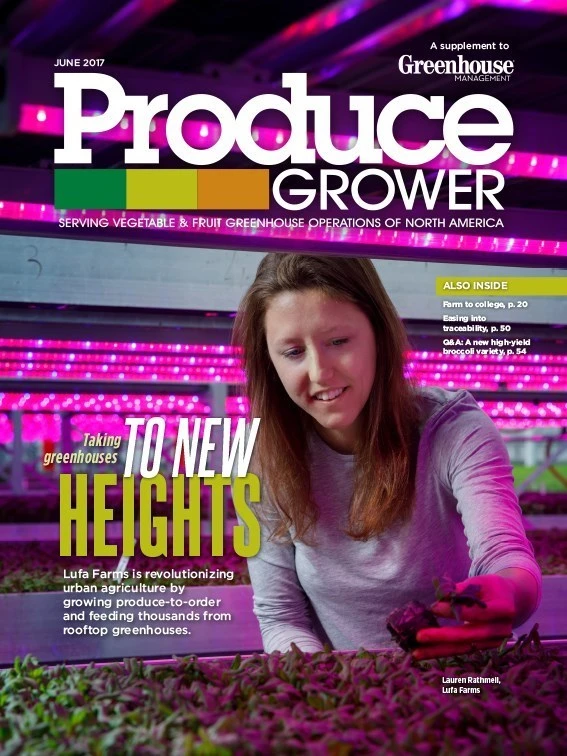
The John Innes Centre, an independent research center focusing on plant science and microbiology based in England, recently developed a new broccoli variety that can go from seed to harvest in eight to 10 weeks. Dr. Judith Irwin, who led the research, answered a few questions about her team’s work and what it means.
Produce Grower: The research you are working on will get broccoli from seed to harvest in eight to 10 weeks. What prompted this broccoli research?
Dr. Judith Irwin: Our aim was to build on work in the model plant species Arabidopsis (conducted by my colleague Professor Dean) — to understand the genetic mechanism regulating how brassica crop plants use seasonal cues — in particular, a period of prolonged cold (namely winter) to synchronize the switch from vegetative to reproductive growth with the arrival of spring.
PG: How did you and the team go about developing this broccoli, step by step?
JI: This has been an ongoing research project where we have used conventional crossing to produce several different [broccoli] lines which require different lengths of cold or, as in the case of this line, no cold at all. This line is therefore part of a range of material.
PG: It has been said that this broccoli will help growers eliminate their reliance on seasonal conditions. Can you explain that in more detail?

JI: As I have mentioned, many varieties that crop at different times of year require periods of cold to trigger flowering (the harvestable crop — the broccoli head — is made up of flower buds). This line does not have this requirement and if grown under protected conditions, will produce a crop year-round. Even outside it potentially could produce two crops in a normal summer season.
PG: A press release from the John Innes Centre mentions that this type of research contributes to “climate-proofing” crops. What exactly does it mean and why is it important?
JI: It is important as our climate is becoming increasingly unpredictable year on year and therefore scheduling crop production is more difficult. Our aim is to try and make crop production more resilient to this variability.
PG: Do you know when the broccoli will be available to growers?
JI: Depending on the next steps in the research, consumer acceptability and nutritional analysis it maybe be possible in the next two to three years.
Cucumber & eggplant
Consider these new varieties for your greenhouse.

Pick a Bushel
This Regional AAS Winner is great for northern areas because it is early to set fruit, offers a prolific quantity of fruit and is a compact bush-type cucumber spreading only about 24 inches. Pick a Bushel offers a sweeter tasting light-green cucumber with a nice firm texture, perfect for pickling when harvested early. Fruits left on the bush-type vines longer can get up to 6 inches.
FOR MORE: panamseed.com

Martini
Stands out from the competition for its non-yellowing white exterior and earlier yields. Very tender, “no peel” skin if harvested at 5 to 6 inches/13 to 15 centimers length; larger fruit will need peeling. Vining, monoecious plants are very high yielding with continuous harvest of high-quality, straight fruit. Staying power in the heat of summer. White interior is bitter-free, very sweet and crunchy. Best in-ground. Powdery mildew resistant.
FOR MORE: panamseed.com

Shikou
Shikou is a long Asian type eggplant with dark, glossy fruit that measure 6-8 inches long by 1-1.5 inches wide, have a purple calyx (or stem), very few seeds, thin tender skin, and a very white interior. Plants are very attractive, medium sized and productive, semi-spineless and mature about seven-eight days from transplant. Shikou is a Japanese word meaning, “supreme.”
FOR MORE: sakatavegetables.com
Gretel

Earliest white eggplant is highly productive, producing clusters of glossy mini-fruit that is tender and non-bitter. Indeterminate, 3-ft. (91-cm) plants have thornless leaves/calyx for easy, painless harvest; can be grown in-ground or in a large container, with or without support. Slightly larger plant with slightly smaller fruit than Hansel.
FOR MORE: panamseed.com
Saladmore Bush

Matures in 55 days from sowing. This semi-bush vine sets sweet crisp cucumbers. Good garden performance due to its multiple disease resistances. Has dual use, pick small for processing as pickles and harvest larger for fresh slices or spears.
FOR MORE:
Patio Baby

Patio Baby is a very early and highly productive eggplant with a compact habit, making it a great choice for containers or in the garden. It is also an All-American Selections winner. Deep purple, egg-shaped fruit should be harvested at baby size — 2 to 3 inches. Thornless leaves and calyxes allow for painless harvesting.Plants will continue to produce fruit throughout the entire season.
FOR MORE: panamseed.com
Get curated news on YOUR industry.
Enter your email to receive our newsletters.
Explore the June 2017 Issue
Check out more from this issue and find your next story to read.
Latest from Produce Grower
- The Growth Industry Episode 3: Across the Pond with Neville Stein
- PG CEA HERB Part 2: Analyzing basil nutrient disorders
- University of Evansville launches 'We Grow Aces!' to tackle food insecurity with anu, eko Solutions
- LettUs Grow, KG Systems partner on Advanced Aeroponics technology
- Find out what's in FMI's Power of Produce 2025 report
- The Growth Industry Episode 2: Emily Showalter on how Willoway Nurseries transformed its business
- 80 Acres Farms expands to Georgia, Texas and Colorado
- How BrightFarms quadrupled capacity in six months






